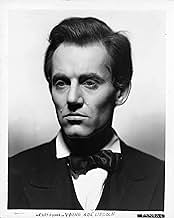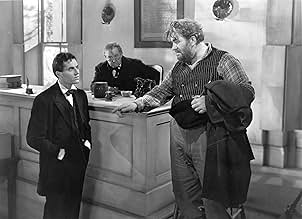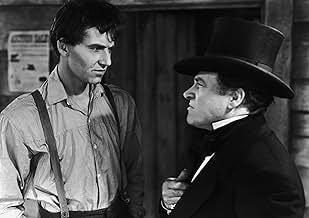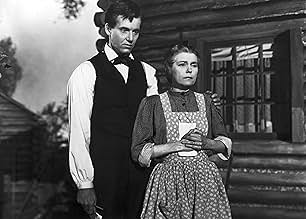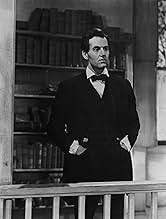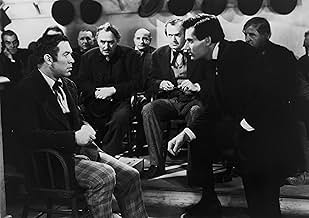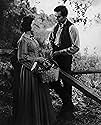Histoire fictive de la jeunesse de ce président américain alors qu'il affronte la plus grosse affaire de sa carrière d'avocat débutant.Histoire fictive de la jeunesse de ce président américain alors qu'il affronte la plus grosse affaire de sa carrière d'avocat débutant.Histoire fictive de la jeunesse de ce président américain alors qu'il affronte la plus grosse affaire de sa carrière d'avocat débutant.
- Nommé pour 1 Oscar
- 3 victoires et 2 nominations au total
- Carrie Sue
- (générique uniquement)
- Man with Lynch Mob
- (non crédité)
- Townsman Dancing at Party
- (non crédité)
- New Salem Townsman
- (non crédité)
- Carrie Sue
- (non crédité)
- Peach Pie Baker
- (non crédité)
- Loafer
- (non crédité)
Histoire
Le saviez-vous
- AnecdotesJohn Ford and producer Darryl F. Zanuck fought an extended battle over control of the film. Ford even had unused takes of the film destroyed so the studio could not insert them into the movie. One scene that Ford insisted on cutting was a scene where Lincoln met his future assassin, a very young John Wilkes Booth.
- GaffesLincoln is shown playing "Dixie" on a Jew's harp. That portion of the film is ostensibly set in the year 1837, but most reliable sources indicate that "Dixie" wasn't written, publicly performed nor published before 1859. During the Civil War, Lincoln was known to be partial to the tune (it was almost as popular in the North in the 1860s as in the South), but it's unlikely he would have heard it in the 1830s.
- Citations
Abe Lincoln: [cross-examining Cass] J. Palmer Cass.
John Palmer Cass: Yes, sir.
Abe Lincoln: What's the "J" stand for?
John Palmer Cass: John.
Abe Lincoln: Anyone ever call you Jack?
John Palmer Cass: Yeah, but...
Abe Lincoln: Why "J. Palmer Cass?" Why not "John P. Cass?"
John Palmer Cass: Well, I...
Abe Lincoln: Does "J. Palmer Cass" have something to hide?
John Palmer Cass: No.
Abe Lincoln: Then what do you part your name in the middle for?
John Palmer Cass: I got a right to call myself anything I want as long as it's my own name!
Abe Lincoln: Well then if it's all the same to you, I'll call you Jack-cass.
[Roar of laughter from spectators]
- ConnexionsFeatured in L'oiseau bleu (1940)
- Bandes originalesThe Battle Cry of Freedom
(1862) (uncredited)
Written by George Frederick Root
Played during the opening credits and sung by an unidentified chorus
John Ford before the shooting starts put him at ease by saying he wasn't going to be playing the Great Emancipator, but just a jack-leg prairie lawyer. That being settled Fonda headed a cast that John Ford directed into a classic film.
This is not a biographical film of Lincoln. That had come before in the sound era with Walter Huston and a year after Young Mr. Lincoln, Raymond Massey did the Pulitzer Prize winning play by Robert Sherwood Abe Lincoln in Illinois. Massey still remains the definitive Lincoln.
But as Ford said, Fonda wasn't playing the Great Emancipator just a small town lawyer in Illinois. The film encompasses about 10 years of Lincoln's early life. We see him clerking in a general store, getting some law books from an immigrant pioneer family whose path he would cross again later in the story. And his romance with Ann Rutledge with her early death leaving Lincoln a most melancholy being.
Fast forward about 10 years and Lincoln is now a practicing attorney beginning to get some notice. He's served a couple of terms in the legislature, but he's back in private practice not really sure if politics is for him.
This is where the bulk of the action takes place. The two sons of that family he'd gotten the law books from way back when are accused of murder. He offers to defend them. And not an ordinary murder but one of a deputy sheriff.
The trial itself is fiction, but the gambit used in the defense of Richard Cromwell and Eddie Quillan who played the two sons is based on a real case Lincoln defended. I'll say no more.
Other than the performances, the great strength of Young Mr. Lincoln is the way John Ford captures the mood and atmosphere and setting of a small Illinois prairie town in a Fourth of July celebration. It's almost like you're watching a newsreel. And it was the mood of the country itself, young, vibrant and growing.
Fans of John Ford films will recognize two musical themes here that were repeated in later films. During the romantic interlude at the beginning with Fonda and Pauline Moore who played Ann Rutledge the music in the background is the same theme used in The Man Who Shot Liberty Valance for Vera Miles. And at a dance, the tune Lovely Susan Brown that Fonda and Marjorie Weaver who plays Mary Todd is the same one Fonda danced with Cathy Downs to, in My Darling Clementine at the dance for the raising of a church in Tombstone.
Lincoln will forever be a favorite subject of biographers and dramatists because of two reasons, I believe. The first is he's the living embodiment of our own American mythology about people rising from the very bottom to the pinnacle of power through their own efforts. In fact Young Mr. Lincoln very graphically shows the background Lincoln came from. And secondly the fact that he was our president during the greatest crisis in American history and that he made a singularly good and moral decision to free slaves during the Civil War, albeit for some necessary political reasons. His assassination assured his place in history.
Besides Fonda and others I've mentioned special praise should also go to Fred Kohler, Jr. and Ward Bond, the two town louts, Kohler being the murder victim and Bond the chief accuser. Also Donald Meek as the prosecuting attorney and Alice Brady in what turned out to be her last film as the pioneer mother of Cromwell and Quillan. And a very nice performance by Spencer Charters who specialized in rustic characters as the judge.
For a film that captures the drama and romance of the time it's set in, you can't do better than Young Mr. Lincoln.
- bkoganbing
- 8 sept. 2005
- Permalien
Meilleurs choix
Détails
Box-office
- Budget
- 1 500 000 $US (estimé)
- Durée1 heure 40 minutes
- Couleur
- Rapport de forme
- 1.37 : 1
Contribuer à cette page


